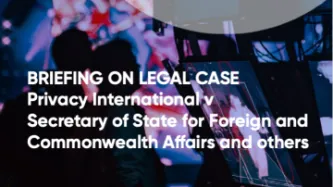Advanced Search
Content Type: Report
First published in 2017, PI’s Guide to International Law and Surveillance is an attempt to collate relevant excerpts from these judgments and reports into a single principled guide that will be regularly updated. This is the fourth edition of the Guide. It has been updated it to reflect the most relevant legal developments until March 2024.The Guide aspires to be a handy reference tool for anyone engaging in campaigning, advocacy, and scholarly research, on these issues. The fourth…
Content Type: Press release
In a landmark judgment, handed down today (Monday 30 January 2023), the Investigatory Powers Tribunal have found that there were “very serious failings” at the highest levels of MI5 to comply with privacy safeguards from as early as 2014, and that successive Home Secretaries did not to enquire into or resolve these long-standing rule-breaking despite obvious red flags.Human rights organisations Liberty and Privacy International, who brought this significant legal case in January 2020, have…
Content Type: Explainer
Introduction/Background
Electronic tags have been a key part of criminal justice offender management for over 20 years, being used in the United States since the mid 1980’s and in the UK and some other commonwealth countries since 2003. In 2021 the UK introduced GPS tagging for immigration bail.
The tag is predominantly used to curtail the liberties of individuals. For those on criminal bail its intended use includes managing return into communities while deterring reoffending.
As we explore…
Content Type: News & Analysis
Update: Based on the complaint, on 30 November 2021 the Ombudsman opened an inquiry into whether the European Commission failed to take into account human rights concerns or carry out human rights impact assessments before providing support to African countries to develop surveillance capabilities.
___
Privacy International (PI) together with a coalition of human rights groups have today called on the European Ombudsman, the EU’s oversight body, to investigate evidence that the block is…
Content Type: Long Read
Additionally, in January 2020 Privacy International and UK-based NGO Liberty filed a new claim against MI5 and the Secretary of State for the Home Department in the Investigatory Powers Tribunal (the “Ungoverned Spaces Case”, this time, the case sought to hold MI5 and the SSHD accountable for systemic, long-term failures in the way they handle and retain millions of people’s personal data. As part of this claim, PI requested that the IPT re-opens parts of the original BPD/BCD. This aspect of…
Content Type: News & Analysis
What happened
On 22 July 2021, the Investigatory Powers Tribunal (IPT) issued a declaration on our challenge to the UK bulk communications regime finding that section 94 of the Telecommunications Act 1984 (since repealed by the Investigatory Powers Act 2016) was incompatible with EU law human rights standards. The result of the judgment is that a decade’s worth of secret data capture has been held to be unlawful. The unlawfulness would have remained a secret but for PI’s work.
You…
Content Type: Long Read
The Grand Chamber of the European Court of Human Rights ruled that the UK government’s historical mass interception program violates the rights to privacy and freedom of expression. The Court held that the program “did not contain sufficient “end-to-end” safeguards to provide adequate and effective guarantees against arbitrariness and the risk of abuse.” As a result the Court ruled that UK law "did not meet the “quality of law” requirement and was therefore incapable of keeping the “…
Content Type: Video
On 6 February 2021, the Constitutional Court of South Africa in a historic judgment declared unconstitutional years of secret and unchecked surveillance by South African authorities against millions of people - irrespective of whether they reside in South Africa.
The Court powerfully placed the judgment in historical context:
The constitutionally protected right to privacy seeks to be one of the guarantees that South Africa will not again act like the police state that it was under apartheid…
Content Type: Long Read
What’s the ruling all about?The Constitutional Court of South Africa in a historic judgment declared that bulk interception by the South African National Communications Centre is unlawful and invalid. Furthermore, the Constitutional Court found that the Regulation of Interception of Communications and Provision of Communication-Related Information Act (RICA) 1) was deficient in failing to provide at least a post-notification procedure for subjects of interception; 2) failed to ensure the…
Content Type: News & Analysis
Today, the Constitutional Court of South Africa in a historic judgment declared that bulk interception by the South African National Communications Centre is unlawful and invalid.
The judgment is a confirmation of the High Court of South Africa in Pretoria’s powerful rejection of years of secret and unchecked surveillance by South African authorities against millions of people - irrespective of whether they reside in South Africa.
The case was brought by two applicants, the amaBhungane Centre…
Content Type: News & Analysis
Today, the UK High Court has quashed a decision by the Investigatory Powers Tribunal (IPT) and held that section 5 of the Intelligence Services Act (ISA) 1994 does not permit the issue of general warrants to authorise property interference and certain forms of computer hacking.
The Court referred to cases dating back to the 18th century, which demonstrate the common law’s insistence that the Government cannot search private premises without lawful authority even in the national security…
Content Type: Press release
Today, the UK High Court has quashed a decision by the Investigatory Powers Tribunal (IPT), and ruled that section 5 of the Intelligence Services Act (ISA) 1994 does not permit the issuing of general warrants to authorise property interference and certain forms of computer hacking.
The Court referred to cases dating back to the 18th century, which demonstrate the common law’s insistence that the Government cannot search private premises without lawful authority even in the context of national…
Content Type: Long Read
Q&A: EU's top court rules that UK, French and Belgian mass surveillance regimes must respect privacy
Content Type: Press release
By treating everyone as a suspect, the bulk data collection or retention regimes engage European fundamental rights to privacy, data protection, freedom of expression, as guaranteed respectively by Articles 7, 8, and 11 of the EU Charter of Fundamental Rights.
Caroline Wilson Palow, Legal Director of Privacy International, said:
"Today’s judgment reinforces the rule of law in the EU. In these turbulent times, it serves as a reminder that no government should be above the law. Democratic…
Content Type: News & Analysis
In September 2019, PI published the report Your Mental Health for Sale. Our investigation looked into popular mental health websites and their data sharing practices.
Our findings suggest that, at the time of the research, most websites we looked at were using third party tracking for advertising purposes, sometimes relying on programmatic advertising technologies such as Real Time Bidding (RTB), sharing personal data with potentially thousands of actors. Some websites were also found sharing…
Content Type: Long Read
In December 2019, the Information Rights Tribunal issued two disappointing decisions refusing appeals brought by Privacy International (PI) against the UK Information Commissioner.
The appeals related to decisions by the Information Commissioner (IC), who is responsible for the UK’s Freedom of Information regime, concerning responses by the Police and Crime Commissioner for Warwickshire and the Commissioner of Police for the Metropolis (The Metropolitan Police) to PI’s freedom of information…
Content Type: News & Analysis
In mid-2019, MI5 admitted, during a case brought by Liberty, that personal data was being held in “ungoverned spaces”. Much about these ‘ungoverned spaces’, and how they would effectively be “governed” in the future, remained unclear. At the moment, they are understood to be a ‘technical environment’ where personal data of unknown numbers of individuals was being ‘handled’. The use of ‘technical environment’ suggests something more than simply a compilation of a few datasets or databases.
The…
Content Type: News & Analysis
Today, the High Court of South Africa in Pretoria in a historic decision declared that bulk interception by the South African National Communications Centre is unlawful and invalid.
The judgment is a powerful rejection of years of secret and unchecked surveillance by South African authorities against millions of people - irrespective of whether they reside in South Africa.
The case was brought by two applicants, the amaBhungane Centre for Investigative Journalism and journalist Stephen…
Content Type: News & Analysis
The Watson/Tele2 decision of the CJEU concerned section 1 and 2 of DRIPA and the Data Retention Regulations 2014. This contained the legislative scheme concerning the power of the Secretary of State to require communications service providers to retain communications data. Part 3 of the Counter-Terrorism and Security Act 2015 amended DRIPA so that an additional category of data - that necessary to resolve Internet Protocol addresses - could be included in a requirement to retain…
Content Type: Long Read
Details of case:
R (on the application of Privacy International) (Appellant) v Investigatory Powers Tribunal and others (Respondents)
[2019] UKSC 22
15 May 2019
The judgment
What two questions was the Supreme Court asked to answer?
Whether section 67(8) of RIPA 2000 “ousts” the supervisory jurisdiction of the High Court to quash a judgment of the Investigatory Powers Tribunal for error of law?
Whether, and, if so, in accordance with what principles, Parliament may by…
Content Type: Long Read
Yesterday, the European Court of Human Rights issued its judgement in Big Brother Watch & Others V. the UK. Below, we answer some of the main questions relating to the case.
What's the ruling all about?
In a nutshell, one of the world's most important courts, the European Court of Human Rights, yesterday found that certain UK laws about how intelligence agencies can spy on our internet communications breach our human rights. These surveillance laws have meant that the UK intelligence…
Content Type: Press release
Key points
Bulk Communications Data (BCD) collection, commenced in March 1998, unlawful until November 2015
Bulk Personal Datasets regime (BPD), commenced c.2006, unlawful until March 2015
Everyone’s communications data collected unlawfully, in secret and without adequate safeguards until November 2015
We maintain that even post 2015, bulk surveillance powers are not lawful
As the Investigatory Powers Bill is set to become law within weeks, we argue that the authorisation and…



















